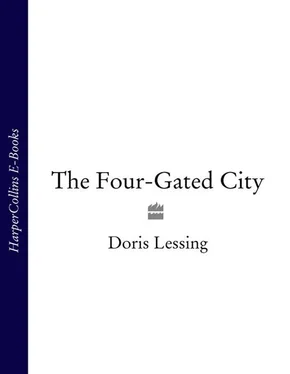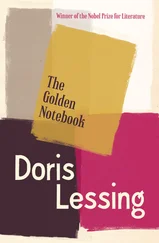The tears poured out, and, as Martha could see, were unchecked because Margaret had noticed Martha was influenced by tears. Martha was now very angry. Months of resentment came pouring out.
‘I know you are much older than me, and ever so experienced, and you’ve always been able to do exactly as you like. But you seem to me like a little girl. You can’t always have your own way. You always have had it, haven’t you? You can’t stop people doing things just because you think it’s no good for them.’
Margaret stared at Martha, not so much surprised, as wary. Then she turned away her wet face and dabbed at it. Martha looked at a reassuring calm back. Martha had even more strongly the feeling that she was an instrument being played upon. When that face was turned to her again, what look would be placed upon it?
No, she was being unfair. Probably Margaret was acting out of instinct – if that made it any better!
Once again, Martha was sitting in the presence of a strong elderly woman, herself a seethe of conflicting emotions, which she could not control. Some time she was going to have to learn to control them.
Margaret turned to her a quiet sobered face.
‘I don’t agree with you,’ she said. ‘If someone’s doing something that’s simply silly, you try and stop them. I wish you’d try and stop Mark. He ought to leave the country for a bit. He could take Francis. He might fall in love with someone that’s some use.’
Martha laughed with resentment. ‘You can’t see that he could never do it? It’s not the kind of thing he could do?’
‘No. I wish you’d try.’
‘No. I’ve got no right – one hasn’t. Not unless you get right into something and – get your hands dirty too. Only if you fight.’
‘And you won’t?’
‘Why should I? It’s not my mess!’
‘You want to get married again I suppose?’
‘Oh for goodness’ sake!’ Martha was becoming incoherent. ‘I don’t want to get married for the sake of it! You talk like a – fortune-teller or something.’
‘Oh! I don’t see why? Why not, if that’s what you want?’
‘Well one doesn’t say, I want to get married and then go out looking – isn’t that what you meant?’
Margaret was almost smiling: she was humouring Martha.
Who now stood up, confronting Margaret. Who stood up, ready to leave. The women were furious with each other.
‘If Mark divorced Lynda, it wouldn’t make any difference. He’d either go pining after Lynda, or he’d be in love with someone else ridiculous and hopeless. Or you’d think she was. Can’t you see that?’
‘Well no,’ drawled Margaret. ‘Frankly, I don’t. But I must bow to your superior wisdom.’
At the door she said: ‘The man’s got the television to work. It’ll be rather fun, watching it on television.’ She laughed, and apparently genuinely. She was looking forward to the evening. ‘In the old days, when I had an election party I had to be careful to keep the left and the right apart – now it’s the left and the left. I suppose Colin wouldn’t come – he can’t, with the case just starting?’
‘I don’t know.’
‘Oh well, if you just lump people into a room, they’ll have to behave. But I must say, if Colin’s coming, then it will be tricky with Phoebe and Arthur and Arthur’s wife. I really can’t imagine why they hate the bolshies so much when they’ve got precisely the same aims. If they had their way, this country’d be as bad as Russia – it’s not so far off as it is.’
With this, she went downstairs again, to arrange drinks and food for her party.
By evening the big room, which Martha had only seen as dead and shrouded in enveloping dust-sheets, was full of flowers, and it had a buffet at one end, the television set at the other. Now it presented itself, discreetly festive, as a setting for parties. People started coming early, the attraction being the television set, as much as the election. Most had not got one, or refused to get one, or might get one if this seemed satisfactory. The set was, in short, the focus of the party, almost its chief guest. Margaret was the only person who adored it. Most people seemed apprehensive: in fact one could more or less work out someone’s political bias from the attitude he took towards television.
By ten or so there must have been fifty people in the room in an atmosphere rather like a sweepstake, or the races; and although outside this room, which imposed a truce, they stood for violent antagonisms. Bets were being made, victories and defeats were cheered or booed, everything went on in the greatest good humour.
The Tories were represented by Margaret herself, and by a man who made an appearance early, a formally good-mannered quiet man who was taken down by Margaret to see the basement. Another tenant for it who she thought would be suitable? The man, Mr Hilary Marsh, was easily overlooked and not remarked much by Martha: afterwards she wished she had paid more attention. There was also strongly present the spirit of Margaret’s first husband; and for her sake even opponents hoped that the Conservative who now held his seat would continue to hold it: he did. The Conservative people held the view that five years of Labour Government had ruined the country by the introduction of red and ruinous socialism, but the electors (they hoped this evening) would see their mistake and where their ingratitude towards their natural governors had led them, and reintroduce the Conservatives.
That section of the Labour Party which actually held the reins (a couple of Ministers were present) was represented by Margaret’s present husband, John, a pleasant man, without much force but with nothing to dislike about him either. He was smilingly attentive to the guests (Margaret’s rather than his, one could not help feeling) and kept the television set working. There was something about him damped down, held back, kept in check – whatever he was, there was a slight uneasiness, hard to put your finger on. Martha felt it: he presented to her the surface merely of an extraordinary control, while he asked the politest kind of question about Mark’s well-being, about Colin. She was pleased when he moved on.
These, the Labour incumbents, held the view that the country had been in such a bad condition after the war, and particularly after years of Tory rule, that they could not have been expected to do better than they had: and that most of their election pledges had remained unfulfilled through no fault of theirs: ‘The Country’ (a phrase that resounded all evening) would understand this and return them to power with a larger majority than before.
The Labour left was represented by Phoebe, by Phoebe’s ex-husband Arthur, and by his present wife, Mary. Phoebe arrived early with her little girls, pretty blonde creatures excited by being up late for the first time in their lives. His wife came early with the two little children from the new family. Phoebe and Mary, who were great friends, and had been for many years, together greeted Arthur who arrived late with a great mass of supporters. He had kept his seat in South London, with a reduced majority. They were all very excited, and he was a hero that evening. Martha wondered if yet again she would be faced with a shape of flesh like one already known – Mark, Colin, the picture of their dead father – whose spirit was yet utterly different; but Arthur did not look like his brothers, or his father. He was a vigorous-looking man, with an open face, blue eyes open to inquiry, a rocky, rugged, craggy man. An agitator. An orator. A troublemaker. His half-hour’s visit did in fact cause some tension in the general well-being, and people seemed pleased when he left, taking with him his wife, his children; and his previous wife and her children. These, the Labour left, all believed that a Labour Government in power after such a war and after years of Tory misrule, needed to be what it was accused of being by people like Margaret and practically the entire Press – vigorously socialist. They despised the larger part of the party they belonged to for cowardice, pusillanimity, for being unsocialist. They believed, however, that the electorate would vote back the Labour Party, because of the existence, in the Labour Party, of people like Arthur, who might yet force it to be what it should be.
Читать дальше












